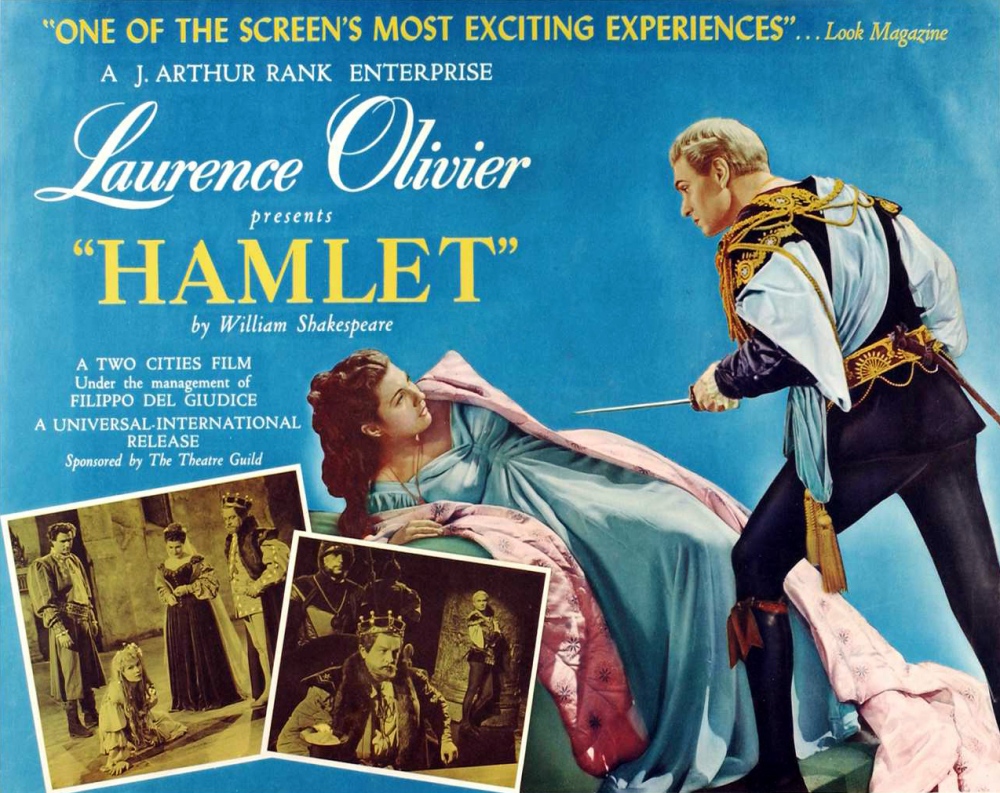
The quintessential Shakespearean actor of his time, playing the quintessential Shakespearean character in the quintessential Shakespearean play—directing it as well, and adapting/heavily cutting the text? It’s hard to imagine a classier enterprise, and the Academy agreed, giving the film Best Picture and Olivier Best Actor, the only Shakespearean film and performance to be so honored.
But how does it hold up 70 years after the fact?
In some aspects, well. At his best, Olivier is one of the most chilling and pathetic screen Hamlets, particularly in the “get thee to a nunnery” scene, where he is so convincing in his “antic disposition” that he breaks Ophelia’s heart—and in showing Hamlet’s grief at having done so, he breaks ours. He makes cunning use of his own fundamental aloofness to depict Hamlet’s ennui, first when bemoaning his mother’s remarriage and last when confronting the inevitability of his own death. He gives in to theatricality at times, but as a whole it is a gripping star turn.
On the other hand, if his acting is mostly superior, his direction is significantly more uneven. He pulls off some fine sequences—the climactic duel is a particularly dynamic set-piece—and his visual sense is quite rich; whatever the reasons for making the film in black-and-white, it works, and between the roaming camera and the stylized, vaguely surreal sets, one can’t help but wonder if he was influenced by late Eisenstein.
At other times, however, his comparative inexperience as a director comes through, and he seems to be striving for effects he can’t quite pull off. The opening scene with the Ghost, for example, is almost incoherent, and the sea battle which allows Hamlet to escape Claudius’ machinations is a pretty dodgy affair. Almost as frustrating is the “Murder of Gonzago” scene, with Claudius reacting like a man plagued more by indigestion than guilt, and a bizarre tumult following his exit which defies explanation.
Olivier’s interpretation of the play doesn’t always help, either. From the infamous epigraph “This is the tragedy of a man who could not make up his mind” to the final glimpse of Getrude’s profoundly labial bed-curtains, there’s a fair amount of symbolism and extra-Shakespearean subtext that just doesn’t work. Why are we shown a flash of Hamlet’s actual brain (just as he’s launching into “To be or not to be”)? Why is the relationship between Hamlet and Gertrude is made so hamfistedly Oedipal? One question carries more weight than the other, but both speak to Olivier’s simultaneous strengths and faults as a director; he was ambitious and imaginative, but he was not always as clever as he believed himself.
The supporting cast is variable. On the plus side are Felix Aylmer’s quirkily sage Polonius, Eileen Herlie’s haunted Gertrude, and Stanley Holloway’s all-too-briefly-seen Gravedigger. On the other hand, Basil Sydney lacks the necessary menace or malice to be a really fine Claudius, while Norman Wooland’s Horatio and Terence Morgan’s Laertes look and act like clean-scrubbed 40s contract players.
Jean Simmons got an Oscar nomination for her Ophelia, and she has moments that work very well, especially when she and Olivier share the screen, but in her histrionic moments she tends to go over the top.
The Oscar-winning sets and costumes are praiseworthy; the sets themselves, with their medieval iconography and low arches, really do bring Eisenstein’s Ivan the Terrible to mind. And William Walton’s score, in marked contrast to his excellent rousing score for Olivier’s Henry V, is often haunting and eerie, adding to the overwhelming tragedy of the scenario.
In the end, it is not the definitive screen Hamlet (if such a thing even exists), but as a chance to see one of the great Shakespeareans essay one of his greatest roles, and interpret perhaps the greatest of all Shakespeare’s plays according to his own vision, it is indispensable. And whatever, its faults, the elements which work and the fundamental greatness of the play keep it compelling throughout.
Score: 80/100